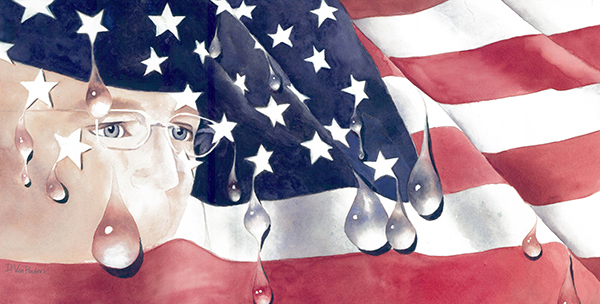‘America, I sing you back’. Musings from a naturalized American in age of Trump
 As a naturalized American, I think it’s fair to say that one is deeply fearful about the state of the US right now. It’s also fair to record the difficulty of explaining to a lot of puzzled people in many places that the US is not really a bigoted country (Donald Trump and his supporters notwithstanding).
As a naturalized American, I think it’s fair to say that one is deeply fearful about the state of the US right now. It’s also fair to record the difficulty of explaining to a lot of puzzled people in many places that the US is not really a bigoted country (Donald Trump and his supporters notwithstanding).
For, as Nobel laureate Joseph Stiglitz has written, irreparable damage has already been done, “damage that will be hard to repair even if he (Mr Trump) is not elected.” This is because, as Mr Stiglitz says , Donald Trump has announced “a striking change in US policies toward others. Trade agreements will be broken, so too will NATO agreements. Everything is to be renegotiated — even the US debt. Trump, in his own dealings, never seemed to have believed that a man’s word was his honor. A contract, a promise to pay, was just the beginning of a negotiation.”
As a naturalized American, it’s pretty hard to say that’s not really what most Americans are like. That they’re not so despicable a people as to care nothing about honor and keeping promises. Or, as Mr Stiglitz explains, that America acts in its own interests but has “been a strong supporter of the international rule of law.” As he explains, Americans “may not always fully live up to our agreements, but we typically do. Countries that violate the rule of law face the risk of sanctions. The enforcement of the international rule of law may be imperfect, but it is better than having no rule of law.”
As a naturalized American it’s hard to cite American Muslims as a great example of US integration and one-nation politics when Mr Trump goes off on a rant about an American Muslim family who lost their son fighting an American war. And when millions of voters in the Republican primaries appeared to support Mr Trump’s exclusivist, anti-Muslim proposals. And when Mr Trump raised $80 m in small donations in July.
People are entitled to be sceptical about what I say. I was not born in the US; nor was I bred there. How authentic can my protestations about America be? Especially when Peggy Noonan writes in The Wall Street Journal that the US is on its way to becoming a “kakistocracy” a Greek word that “means government by the worst persons, by the least qualified or most unprincipled.”
Ms Noonan, everyone will say, should know. What would you, a naturalized American know?
Well, I only say what I myself have found to be true. About American inclusiveness and generosity, hard work, honesty and the belief in rule of law.
And one of the great poems that to me seems to symbolize the US is Allison Adelle Hedge Coke’s ‘America, I Sing You Back’.
Ms Hedge Coke’s heritage and the reality of her circumstances is literally America – all of it, warts and all, racially and in terms of societal issues. She has Huron and Metis blood. The first are indigenous people of North America, the second are of mixed European and indigenous ancestry, and one of the three recognized Aboriginal peoples in Canada. Her mother was schizophrenic and Ms Hedge Coke herself struggled in her youth with alcoholism. But she has displayed a (very American) can-do spirit throughout her life – as a mentor to Native Americans — on reservations, in juvenile facilities, mental institutions, and in prisons. She has also worked with other vulnerable young people, again, typically the sort of community-minded endeavour I associate with America and Americans.
It’s very moving to read her love song to America, especially the words “as I cried this country, my song grew roses in each tear’s fall.”
The full poem is below:
America, I Sing You Back
America, I sing back. Sing back what sung you in.
Sing back the moment you cherished breath.
Sing you home into yourself and back to reason.
Before America began to sing, I sung her to sleep,
held her cradleboard, wept her into day.
My song gave her creation, prepared her delivery,
held her severed cord beautifully beaded.
My song helped her stand, held her hand for first steps,
nourished her very being, fed her, placed her three sisters strong.
My song comforted her as she battled my reason
broke my long-held footing sure, as any child might do.
As she pushed herself away, forced me to remove myself,
as I cried this country, my song grew roses in each tear’s fall.
My blood-veined rivers, painted pipestone quarries
circled canyons, while she made herself maiden fine.
But here I am, here I am, here I remain high on each and every peak,
carefully rumbling her great underbelly, prepared to pour forth singing—
and sing again I will, as I have always done.
Never silenced unless in the company of strangers, singing
the stoic face, polite repose, polite while dancing deep inside, polite
Mother of her world. Sister of myself.
When my song sings aloud again. When I call her back to cradle.
Call her to peer into waters, to behold herself in dark and light,
day and night, call her to sing along, call her to mature, to envision—
then, she will quake herself over. My song will make it so.
When she grows far past her self-considered purpose,
I will sing her back, sing her back. I will sing. Oh I will—I do.
America, I sing back. Sing back what sung you in.

